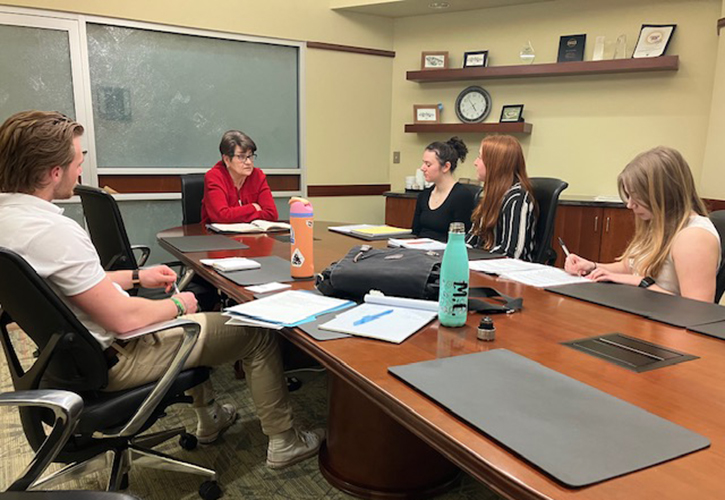College of Arts and Sciences Newsroom

UD biology professor launches new course on air pollution and human health
By Lucy Waskiewicz ’24
University of Dayton students in a pilot biology course combated air pollution by speaking with local politicians, publishing letters in newspapers and studying the effects of dirty air on human health.
Mary Ellen Dillon, a principal lecturer in the UD Department of Biology, launched Air Pollution and Human Health during the 2024 spring semester. Her students examined the science, history and politics of air pollution — and how they can advance the health of their communities as sustainability leaders.
Dillon, who earned her master’s degree in sustainability from Harvard University during the COVID-19 pandemic, wanted to explore air pollution through an interdisciplinary lens.
“I primarily teach foundational level courses, but wanted to take this course further and deeper,” she said. “We have environmental biology and sustainability, but no one really focuses on air pollution. It’s one of the top killers globally and it’s all around us, but a lot of people don’t yet know about it.”
The seminar-style course centered on interdisciplinary learning and community engagement. For the first half of the semester, the class studied the science of air pollution, its effects on human health and the history of clean energy and sustainability politics in Ohio.
The second half of the course focused on experiential learning. In February, students met with former Ohio state senator and Kettering Mayor Peggy Lehner to discuss the city’s recent sustainability award and Lehner’s perspective on the 2020 Ohio nuclear bribery scandal, also known as the House Bill 6 scandal.
The political corruption scheme, which involved $60 million in bribes influencing Ohio politicians to bail out two nuclear power and two coal plants and repealed some of the state’s renewable energy standards, was a focal point of Dillon’s course. While the nuclear power plant subsidies were repealed in 2021, the coal subsidies of House Bill 6 are still in effect.

Dillon’s students created an online petition calling for the full repeal of House Bill 6. They also wrote letters to the editor and opinion pieces for local news outlets advocating for the bill’s repeal, two of which have been published.
James Brown, a sophomore biology major from Canton, Ohio, had his letter to the editor of the Canton Repository published in March. Afterward, he organized a meeting with a local representative to further discuss the repeal of House Bill 6, for which Dillon helped him prepare.
“I feel more prepared than ever to engage in local politics and to have conversations that matter with my peers and professionals alike,” Brown said. “I’ve learned that it's not only the policymakers that influence what laws are passed.”
Emily Bednarski, a sophomore sustainability major from Cleveland, also had a letter to the editor published in the Dayton Daily News. She said the publication and the class have made her more skilled in communicating to different audiences about the importance of sustainability.
“This experience has helped me become a sustainability advocate and learn different ways to communicate across different disciplines,” she said. “This is important to my career. I want to go into business and you have to code-switch for those who don't necessarily care about the environment and only want to talk about economic benefits.”
Students also studied other current events relevant to air pollution, such as the 2023 Canadian wildfires that spread smoke to various American cities, including Dayton.
As Dillon’s class prepares for their post-graduate plans, many said the course has influenced their career paths. Evelyn Thomson, a senior environmental biology major from Cincinnati, said the class piqued her interest in sustainability-centered careers.
“Before this class, I was only interested in pursuing a career in biological or ecological research, but after taking this course I have broadened my horizons,” Thomson said. “I have developed many skills related to public speaking, social outreach and sustainable leadership. This class has also sprouted an interest in working in government committee positions in order to help make my community a better place.”
Dillon said the skills her students are learning in the classroom are empowering them to make a difference in their communities.
“They’re learning skills for their futures,” she said. “They’re learning how to write, how to communicate, who to talk to, how to talk to them and how to make a difference. It’s one thing to learn about all these concepts in a bubble, but another thing to go out and apply them.”
For more information, visit the UD Department of Biology website.
Middle of page (l-r), UD students Evelyn (Evie) Thomson, Emily Bednarski, Lily Votta and James Brown, IV, pose with Kettering Mayor Peggy Lehner (middle).
